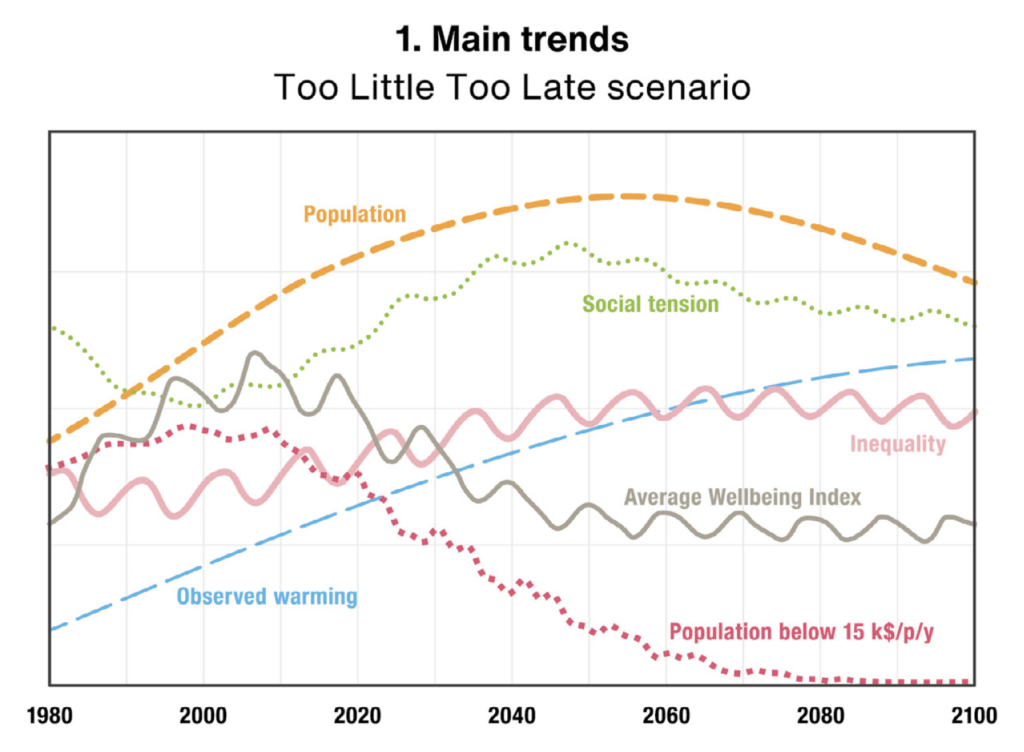
Over 50 years ago the Club of Rome (CoR) made big news with the report “The Limits to Growth”. Last month another report came out that seems more optimistic than “Limits”.
The CoR is an international think-tank of high-level people who tackle the world’s problems, including poverty, environmental deterioration and human population. “Limits” was based on an early computer simulation that looked at 5 variables: population, food production, industrialization, pollution and consumption of nonrenewable natural resources. The first of these were assumed to be increasing exponentially, while production was thought to be linear. Two of 3 scenarios in the program predicted “overshoot and collapse” of civilization before 2100. This is about as pessimistic as you can get!
In contradistinction to “Limits”, the CoR has published another report which I fear is overly optimistic. “People and Planet” predicts that global population will stop its growth around 2050, with a maximum of 8.8 billion people. This is very different for the United Nations prediction, which projects continued growth until the end of this century, with a population over 11 billion.
I first read about this report in The Guardian. The title of that article is: “World ‘population bomb’ may never go off….” This title did what a title is supposed to do—it grabbed my attention. However, it is wrong! The population bomb has already exploded. We are facing problems caused by overpopulation: climate chaos, and the extinction crisis both clearly have as their root cause our high population density. The increase in global aggression may also be related to overpopulation.
People and Planet has a different way of predicting population. It is based on an observation that increased education (especially of girls and women) is associated with decreased family size. This has been observed many times in many different societies. It makes sense! Girls who are in school are better able to access and use family planning. Women who are in school or college are less likely to get married and start their families. Later, when they join the workforce, they are more likely to want to put more energy into their careers and less into childcare. Perhaps most important, educated women are less likely to be bossed by pronatalist, misogynistic men.
The hope is that increased attention to education, especially in African countries, will speed up fertility decline. My observations, however, suggest that is difficult to achieve.
People and Planet gives two projections for the future; one of them is hopeful. The current scenario is called “Too Little Too Late” (TLTL), but the CoR advocates for “Giant Leap”. This would entail 5 steps: ending poverty, addressing gross inequality, empowering women, making our food system healthy for people and ecosystems, and transitioning to clean energy.
“Giant Leap” would not be perfect, although it would get us closer to sustainability. It is also projected to reach peak global population a decade earlier than TLTL. I can see us transitioning to clean energy (it’s cheaper!), and women are already doing a great job of empowering themselves. Unfortunately, the current legal system and capitalism are designed to maintain the status quo; they make it problematic to address gross inequality and to end poverty. Furthermore, it is difficult for me to imagine what it would take to revolutionize the global food production system; again, there are too many vested interests in maintaining the status quo. I fear that there is too much greed in our species for us to take the giant leap that is needed for us to live sustainably.
© Richard Grossman MD, 2023
